|
In the recent graduation ceremony I decided to play Processional and Gaudeamus igitur anthem in E major key. Hope you will enjoy the beautiful sounds of the elegant organ at the amazing Vilnius University Aula Parva! We support Ukraine: https://www.blue-yellow.lt/en If you like what I do, you can buy me some coffee: https://www.buymeacoffee.com/organduo PayPal: https://PayPal.Me/VPinkevicius My Hauptwerk setup: https://www.organduo.lt/tools.html Total Organist - the most comprehensive organ training program online: https://www.organduo.lt/total-organist Secrets of Organ Playing - When You Practice, Miracles Happen! https://organduo.lt Listen to my organ playing on Spotify: https://open.spotify.com/artist/0ckKPIvTWucoN3CZwGodCO?si=YWy7_0HqRvaZwBcovL-RKg
Comments
Yesterday Vidas and I played our organ recital of Ukrainian and Lithuanian music at Vilnius St. Casimir's church during concert series "Gloria to Freedom" ("Gloria laisvei"). Thanks goes to Renata Marcinkute Lesieur for invitation! It was a pleasure to play such patriotic program on this Oberlinger organ (45/III/Ped, 1968/2003). Hope you will enjoy it too! PROGRAM 00:00 1. Variations on the Ukrainian National Anthem, Op. 226 for organ duet by Vidas Pinkevicius (b. 1976) (Ausra and Vidas) Score: www.sheetmusicplus.com/title/variations-on-ukrainian-national-anthem-op-226-organ-duet-by-vidas-pinkevicius-digital-sheet-music/22432710?aff_id=454957 10:15 2. Reverie by Juozas Naujalis (1869-1934) (Ausra and Vidas) 13:40 3. Dance on Ukrainian Folk Song "The Cossack Rode Beyond the Danube" ("Їхав козак за Дунай"), Op. 93 by V. Pinkevicius (Ausra) Score: www.sheetmusicplus.com/title/dance-on-ukrainian-folk-song-the-cossack-rode-beyond-the-danube-op-93-organ-solo-digital-sheet-music/22259368?ac=1&aff_id=454957 15:40 4. Ad Patres by Bronius Kutavičius (1932-2021), Sonata for two organists after the cycle of 7 paintings "Funeral symphony" by Mikalojus Konstantinas Ciurlionis, edited by Jurate Landsbergyte (Vidas and Ausra) 29:30 5. March on the Ukrainian Riflemen Song " Oh, in the Meadow Red Viburnum" (“Oy u luzi chervona kalyna”), Op. 83 by V. Pinkevicius (Vidas) Score: www.sheetmusicplus.com/title/march-on-ukrainian-riflemen-song-oh-in-the-meadow-red-viburnum-op-83-organ-solo-digital-sheet-music/22259176?ac=1&aff_id=454957 32:48 6. Meditation on the Ukrainian Folk Song “Oy vershe miy, vershe” Op. 227 (Vidas) Score: www.sheetmusicplus.com/title/meditation-on-ukrainian-folk-song-oy-vershe-miy-vershe-op-227-organ-solo-by-vidas-pinkevicius-digital-sheet-music/22435137?aff_id=454957 36:48 7. Four Lithuanian Folk Songs by Kristina Vasiliauskaitė (g.1956) (Ausra and Vidas) “Oi lekia lekia” “Zur zur malyna” “Oi tu rugeli žiemkentėli” “Un kalno rugiai” 45:00 8. Prayer for Ukraine "Боже великий, єдиний" by Mykola Lysenko (1842-1912) (Ausra) 47:58 9. Vidas Pinkevičius “Hey sokoly”, Op. 225 for organ duet by V. Pinkevicius (Vidas and Ausra) Score: www.sheetmusicplus.com/title/hey-sokoly-op-225-organ-duet-by-vidas-pinkevicius-digital-sheet-music/22431657?aff_id=454957 More information about the Oberlinger organ: vargonai.lt/vargonai_vilnius_kazimiero.htm We support Ukraine: www.blue-yellow.lt/en If you like what I do, you can buy me some coffee: www.buymeacoffee.com/organduo PayPal: PayPal.Me/ausramotuzaite My Hauptwerk setup: www.organduo.lt/tools.html Total Organist - the most comprehensive organ training program online: www.organduo.lt/total-organist Secrets of Organ Playing - When You Practice, Miracles Happen! organduo.lt Listen to my organ playing on Spotify: open.spotify.com/artist/2pXxZgiFPMKiqBRYi9rSLT?si=Xe1nTroTSmOGPtv8bP8MSw Welcome to this exciting music tutorial on "9 Steps in Mastering Fanfare by Lemmens". In this video, I will be exploring the intricacies of mastering one of the most iconic compositions by Belgian composer Jacques-Nicolas Lemmens. In this step-by-step guide, I will break down the fanfare into 9 simple yet crucial steps that will help you master this composition with ease. Whether you are a beginner or an advanced player, this tutorial is perfect for you. I will guide you through each step, explaining the techniques that will help you play it in a fast concert tempo. Along with the explanations, I will also provide demonstrations to make it easier for you to follow along. By the end of this video, you will have a comprehensive understanding of Lemmens' Fanfare and be able to play it flawlessly. So, grab your instrument and join me on this musical journey as we master the Fanfare by Lemmens together. Don't forget to like, comment, and subscribe to my channel for more exciting music tutorials like this one! We support Ukraine: https://www.blue-yellow.lt/en If you like what I do, you can buy me some coffee: https://www.buymeacoffee.com/organduo PayPal: https://PayPal.Me/VPinkevicius My Hauptwerk setup: https://www.organduo.lt/tools.html Total Organist - the most comprehensive organ training program online: https://www.organduo.lt/total-organist Secrets of Organ Playing - When You Practice, Miracles Happen! https://organduo.lt Listen to my organ playing on Spotify: https://open.spotify.com/artist/0ckKPIvTWucoN3CZwGodCO?si=YWy7_0HqRvaZwBcovL-RKg Juozas Naujalis was (1869-1934) was Lithuanian Romantic composer, organist and choir conductor. He was one of the most significant musical figures in Lithuania at the beginning of the 20th century. He organised musical schools, choral societies, choir festivals and published calendar for organists. Today I'd like to share with you his Prelude No. 1 from the cycle of 14 Preludes for the organ which are dedicated to his friend priest Teodoras Brazys. Hope you will enjoy the sounds of Oberlinger organ at Vilnius St. Casimir's church. Thanks to Renata Marcinkute Lesieur for letting me play there! Score with fingering and pedaling: secrets-of-organ-playing.myshopify.com/products/prelude-in-c-major-op-20-no-1-by-juozas-naujalis-with-fingering-and-pedaling?_pos=1&_sid=ab631bef4&_ss=r We support Ukraine: www.blue-yellow.lt/en If you like what I do, you can buy me some coffee: www.buymeacoffee.com/organduo PayPal: PayPal.Me/VPinkevicius My Hauptwerk setup: www.organduo.lt/tools.html Total Organist - the most comprehensive organ training program online: www.organduo.lt/total-organist Secrets of Organ Playing - When You Practice, Miracles Happen! organduo.lt Listen to my organ playing on Spotify: open.spotify.com/artist/0ckKPIvTWucoN3CZwGodCO?si=YWy7_0HqRvaZwBcovL-RKg On the anniversary of the terrible war in Ukraine, I'd like to share my new composition - a theme and 6 variations for two organists to be played with four hands and two feet. It is based on the melody of the Ukrainian National Anthem. This piece is designed to spread awareness about the tragedy of Ukrainian people and the war crimes being committed by the Russian aggressors in Ukraine. It will give a voice to organists who are at a loss for words but cannot keep silent in the face of the unthinkable situation the brave Ukrainian people are experiencing every day. This composition will be very effective for concert programs. I've recorded this demo version using Sibelius/Hauptwerk VST plugin. The piece will be premiered live by Ausra and me this Sunday at Vilnius St. Casimir's church during a recital in the festival "Gloria to Freedom". This piece is dedicated to prominent Ukrainian organists Olenka Matselyukh and Nadiya Velychko. Score: www.sheetmusicplus.com/title/variations-on-ukrainian-national-anthem-op-226-organ-duet-by-vidas-pinkevicius-digital-sheet-music/22432710?aff_id=454957 We support Ukraine: www.blue-yellow.lt/en If you like what I do, you can buy me some coffee: www.buymeacoffee.com/organduo PayPal: PayPal.Me/VPinkevicius My Hauptwerk setup: www.organduo.lt/tools.html Total Organist - the most comprehensive organ training program online: www.organduo.lt/total-organist Secrets of Organ Playing - When You Practice, Miracles Happen! organduo.lt Listen to my organ playing on Spotify: open.spotify.com/artist/0ckKPIvTWucoN3CZwGodCO?si=YWy7_0HqRvaZwBcovL-RKg Meditation on Bachofen, Op. 219 (arr. for Organ Duet ) | Vidas Pinkevicius | Hauptwerk Salsbury2/23/2023 This is a meditation on the hymn tune Bachofen, Op. 219 arranged for organ duet in the key of F major. The tune is presented in the right hand part of the Primo player. The other parts play interesting ostinato figures. This piece will be very effective in liturgical organ playing and recital programs. Recorded using Sibelius/MIDI/Hauptwerk Salisbury software. Score: www.sheetmusicplus.com/title/meditation-on-bachofen-op-219-organ-duet-by-vidas-pinkevicius-digital-sheet-music/22426411?aff_id=454957 We support Ukraine: www.blue-yellow.lt/en If you like what I do, you can buy me some coffee: www.buymeacoffee.com/organduo PayPal: PayPal.Me/VPinkevicius My Hauptwerk setup: www.organduo.lt/tools.html Total Organist - the most comprehensive organ training program online: www.organduo.lt/total-organist Secrets of Organ Playing - When You Practice, Miracles Happen! organduo.lt Listen to my organ playing on Spotify: open.spotify.com/artist/0ckKPIvTWucoN3CZwGodCO?si=YWy7_0HqRvaZwBcovL-RKg SOPP701: How do two tablets with the music score know when to switch as they do when you turn pages?2/22/2023
Vidas: Hello and welcome to Secrets of Organ Playing Podcast!
Ausra: This is a show dedicated to helping you become a better organist. V: We’re your hosts Vidas Pinkevicius... A: ...and Ausra Motuzaite-Pinkeviciene. V: We have over 25 years of experience of playing the organ A: ...and we’ve been teaching thousands of organists online from 89 countries since 2011. V: So now let’s jump in and get started with the podcast for today. A: We hope you’ll enjoy it! V: Hi guys! This is Vidas. A: And Ausra. Vidas: Let’s start episode 701 of Secrets of Organ Playing Podcast. This question was sent by Richard, and he writes: “Hey Vidas, I just watched your video of 4 movements your Nun Danket Suite - VERY nice. Question: how do the tablets with the music score know when to switch as they do? Thanks! Richard” Vidas: So, this is a question about page turning. Right? Ausra: Yes, it is. Vidas: Want to answer that, Ausra? Ausra: Well, I just remember a very funny story when we had some house guests during my last birthday, and I was telling to one of them about how I can turn pages by just blinking my eye, and that person actually thought that I’m making fun of her. She could not believe that things like this are possible, and she thought I’m making a joke and sort of teasing her. But actually, that’s possible. You just need to have an app for that, and… Vidas: Two apps! Ausra: Yes, two apps, and Vidas will tell you now more about them. Vidas: Yeah, first of all we use iPads. Obviously it could work with iPhones, but the screen is too small for note reading, but we use an app called ForScore. It’s connected to an iPad, and then if it’s just one tablet, one iPad, you can use just this forScore and that’s it. It would require probably a pro subscription, this blinking or facial movement feature. It’s not expensive at all, but you pay every year and then you get this extra feature. But if you have two tablets, then you need another app from the same maker. It’s called Cue! C-u-e. It’s also from the app store. And once you download it, you open the forScore app on the main iPad where your score is, and then you open the Cue app on the secondary iPad. Does it make sense, Ausra? Ausra: Oh yes. Vidas: Yes? And then what happens, you configure—you ask to connect both tables—right? It’s called “double page feature” in Cue. And once you turn the page by touching the screen or blinking or moving your lips, the page turns every two pages, not one, not every page, right? So it’s like a double page feature. Ausra: And it’s excellent, because in that case you are playing like from the real score—like from the book! Vidas: Yeah, if, let’s say, I have to go to church and play in a live setting like in a graduation, I may not need this secondary iPad, because maybe a piece is quite short that I’m playing for that—one or two pages, I can just blink once or twice. That’s ok. But if it’s a longer piece or part of a recital, having two screens is really really nice. Ausra: Yes, because imagine like Vidas and I, you probably noticed that we play a lot of organ duets, and such really long pieces like Concertos, Brandenburg Concertos by J. S. Bach that have many many pages. So if your piece let’s say takes like 40 or 50 pages, then imagine how many page turnings you will have to do, and it’s really time consuming, and to touch the screen once in a while is much easier than to physically turn the page. Vidas: Yeah, we thought about consuming trees, about that, but I think it’s not only about that because I think the most important reason why we have those two tablets is convenience, as Ausra said. We tried to turn the pages on paper and then compare with the tablet, and it’s obviously much faster just to click on the screen, right, with a tap of a finger, let’s say, if you need to tap once, than to physically turn the page using the paper. And sometimes texture is like that, where you don’t have much time to turn, but you have just enough time to tap on the screen, let’s say, and that would be enough. Ausra: And of course, you know, having tablets like this, you can have some fun and make jokes out of each other! For example, just a few days ago Vidas was sitting on the organ bench at home and practicing and I wanted to make a joke on him—play a joke, actually, and I stood behind him, he could not see me, and I would start blinking just like this, and his pages started to turn like back and forth, and he even swared! So… Vidas: Swore. Ausra: Swore, yes. I had fun. Vidas: Yeah, um… Ausra: Don’t do that on purpose, of course, and don’t do that during a recital, you know… Vidas: Maybe I… Ausra: It wouldn’t be nice, but… Vidas: Maybe it would be nice! Maybe we should do that! Ausra: No! But it was fun actually, just to make fun and to hear how you swear. Vidas: You know, sometimes people say oh it’s cheaper to use electronics than paper. It is not, actually. I calculated how many photocopies you would have to make in order to make up for the price you paid for that iPad or two iPads. Right? You would have to have hundreds of thousands of copies on paper if you pay, let’s say, two cents or more for each copy… Ausra: Plus, you know, we are not the cheaters. We always… well, we never sort of break the copyright rule, and if we do, take pictures of music, it means that we still owned the hard copy or digital copy of the score! So for example we have all paper version of “Neue Bach Ausgabe,” but still we just make photographs out of the real book and put it on our forScore program. Vidas: Yeah, we just scan them using the app. It has scanning features, too. So it’s really really nice. Yeah, we recommend it. Right, Ausra? Ausra: Yes. It’s really handy to… Vidas: Plus you don’t have to bring all your books with you on tour if you go abroad when you go to recitals. You just have one or two iPads, and it’s good when you have an important event like this, you keep a backup on each of the iPads… backup scores. Not only on one, but on both! Ausra: Yes, yes! Vidas: If something happens with one iPad, you at least have a secondary iPad to work from, which wouldn’t be very convenient, yes, to have twice as many page turns, but... Ausra: but still… Vidas: ...still, it could work. Ausra: Yes, you could do it. Vidas: It hasn’t happened to us, but I’ll tell you what happened, actually, during our last recital at St. Casimir’s Church, right after Christmas, on the second day of Christmas, Ausra was waiting for her turn—the first piece was mine, so it was like 5 minutes before recital, I opened the iPad started selecting the music on both of them to connect Cue and forScore and put them on the music rack, and then I noticed that sometimes this iPad behaves in a weird way. Sometimes, the Cue app doesn’t work! Right? Doesn’t give you the secondary page, and I knew that would happen, you just have to refresh each app, forScore and the Cue app, both of them. You just close them completely and then open them again, connect them, it would maybe take 30 seconds. Yes? And I had 5 minutes before recital, and I figured if that happens, I’ll still be quite safe. But the first time in our experience, it didn’t work. Even after refreshing both apps, it didn’t work. It was stressful knowing that time is running out. Ausra doesn’t know anything about that; she’s preparing on the left, she is not looking at me, and then I’m trying to figure out what to do. So then I just manually restarted both iPads, and that fixed it. But of course, it took like 2 minutes, maybe, with everything, with refreshment and restarting. So 2 more minutes, yeah. Save a little bit more time for that if you have some very important event. Start a little bit earlier. Prepare yourself. Have some additional time. Right, Ausra? Ausra: Yes. But actually, you know, things happen even with the paper notes, too. Sometimes they fall down, or you know if you are playing from unattached pages you would sneeze during your performance and all the music would fly through the church. Vidas: I agree. Be prepared for some unprepared, unexpected event. Okay guys, we hope this was useful to you. Please send us more of your questions; we love helping you grow. And remember, when you practice, Ausra: Miracles happen! V: This podcast is supported by Total Organist - the most comprehensive organ training program online. A: It has hundreds of courses, coaching and practice materials for every area of organ playing, thousands of instructional videos and PDF's. You will NOT find more value anywhere else online... V: Total Organist helps you to master any piece, perfect your technique, develop your sight-reading skills, and improvise or compose your own music and much much more… A: Sign up and begin your training today at organduo.lt and click on Total Organist. And of course, you will get the 1st month free too. You can cancel anytime. V: If you like our organ music, you can also support us on Buy Me a Coffee platform and get early access: A: Find out more at https://buymeacoffee.com/organduo Welcome to this video where you can join me in a gentle meditation and listen to the soothing melodies of "The Call of Home" by James Michael Stevens on the organ at VU St. John's Church. In this video, I will be playing the solo voice in the right hand part with the charming Oboe stop, which will take you on a calming journey of relaxation and inner peace. As you listen to the beautiful organ music, let your mind drift away from the distractions of daily life and allow yourself to sink into a state of serenity. The soft notes of the organ will transport you to a place of tranquility, where you can let go of any stress or worries and just be present in the moment. This beautiful piece of music is part of the Cantabile I collection by James Michael Stevens who is a prolific composer with a passion for creating beautiful melodies that uplift and inspire the soul. The Vilnius University St. John's Church is a beautiful venue for this performance, with its stunning architecture and acoustics that perfectly capture the essence of the music. So sit back, relax, and let the beautiful sounds of the organ transport you to a place of inner peace and calm. Whether you're looking to unwind after a long day or simply need a moment of quiet reflection, this gentle meditation is the perfect way to soothe your mind, body, and spirit. Thank you for watching, and I hope this beautiful piece of music brings you a sense of peace and tranquility. Score: www.sheetmusicplus.com/title/cantabile-vol-i-organ-book-digital-sheet-music/22415327?aff_id=454957 We support Ukraine: www.blue-yellow.lt/en If you like what I do, you can buy me some coffee: www.buymeacoffee.com/organduo PayPal: PayPal.Me/VPinkevicius My Hauptwerk setup: www.organduo.lt/tools.html Total Organist - the most comprehensive organ training program online: www.organduo.lt/total-organist Secrets of Organ Playing - When You Practice, Miracles Happen! organduo.lt Listen to my organ playing on Spotify: open.spotify.com/artist/0ckKPIvTWucoN3CZwGodCO?si=YWy7_0HqRvaZwBcovL-RKg Welcome to our latest video featuring an incredible performance of Franz Schubert's "An die Musik" by baritone Modestas Jankunas and myself at the organ. The stunning venue today is none other than the historic St. John's church at Vilnius University. In this beautiful rendition of the beloved Schubert Lied, Modestas Jankunas brings his rich, velvety baritone voice to the fore, with every note perfectly complemented by the soaring acoustics of the church. With his exquisite phrasing and flawless technique, Jankunas delivers a truly unforgettable performance that is sure to leave you captivated. Whether you're a die-hard fan of Schubert or simply love beautiful music, this performance is not to be missed. So sit back, relax, and let the gorgeous sounds of "An die Musik" transport you to another world. Thanks for watching! We support Ukraine: https://www.blue-yellow.lt/en If you like what I do, you can buy me some coffee: https://www.buymeacoffee.com/organduo PayPal: https://PayPal.Me/VPinkevicius My Hauptwerk setup: https://www.organduo.lt/tools.html Total Organist - the most comprehensive organ training program online: https://www.organduo.lt/total-organist Secrets of Organ Playing - When You Practice, Miracles Happen! https://organduo.lt Listen to my organ playing on Spotify: https://open.spotify.com/artist/0ckKPIvTWucoN3CZwGodCO?si=YWy7_0HqRvaZwBcovL-RKg The other day Ausra and I went to practice at Vilnius Franciscan church on the beautiful Januszkiewicz/Kalnins Baroque style organ "Big Blue", designed by Andrzej Szadejko. It was rather cold inside but totally worth it! Today I'd like to share with you the video with two settings of "Allein Gott in der Höh sey Ehr" (Cantus firmus in soprano and Bicinium) by Georg Philipp Telemann. Thanks to Alicja Dacewicz for letting us play there! Score: www.sheetmusicplus.com/title/choralvorspiele-sheet-music/2424470?aff_id=454957 We support Ukraine: www.blue-yellow.lt/en If you like what I do, you can buy me some coffee: www.buymeacoffee.com/organduo PayPal: PayPal.Me/VPinkevicius My Hauptwerk setup: www.organduo.lt/tools.html Total Organist - the most comprehensive organ training program online: www.organduo.lt/total-organist Secrets of Organ Playing - When You Practice, Miracles Happen! organduo.lt Listen to my organ playing on Spotify: open.spotify.com/artist/0ckKPIvTWucoN3CZwGodCO?si=YWy7_0HqRvaZwBcovL-RKg |
DON'T MISS A THING! FREE UPDATES BY EMAIL.Thank you!You have successfully joined our subscriber list.  Photo by Edgaras Kurauskas Photo by Edgaras Kurauskas
Authors
Drs. Vidas Pinkevicius and Ausra Motuzaite-Pinkeviciene Organists of Vilnius University , creators of Secrets of Organ Playing. Our Hauptwerk Setup:
Categories
All
Archives
July 2024
|
This site participates in the Amazon, Thomann and other affiliate programs, the proceeds of which keep it free for anyone to read.
Copyright © 2011-2024 by Vidas Pinkevicius and Ausra Motuzaite-Pinkeviciene.
Terms of Service and Privacy Policy
Copyright © 2011-2024 by Vidas Pinkevicius and Ausra Motuzaite-Pinkeviciene.
Terms of Service and Privacy Policy

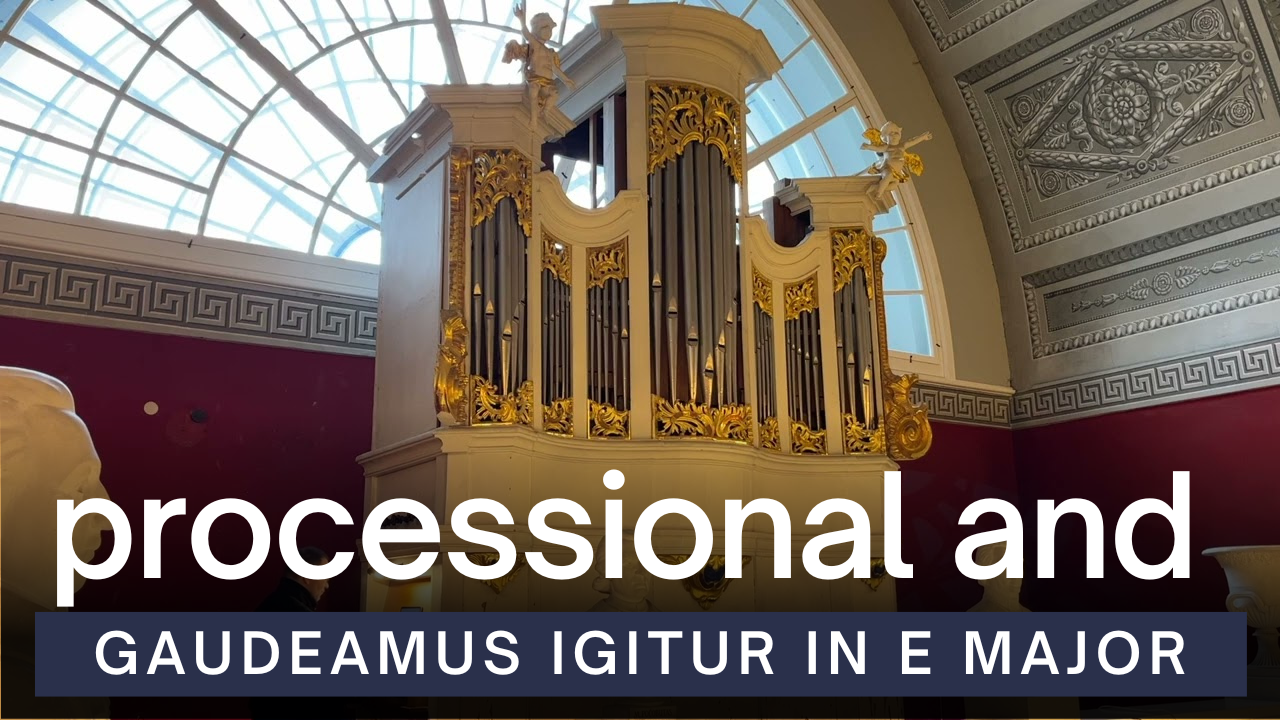
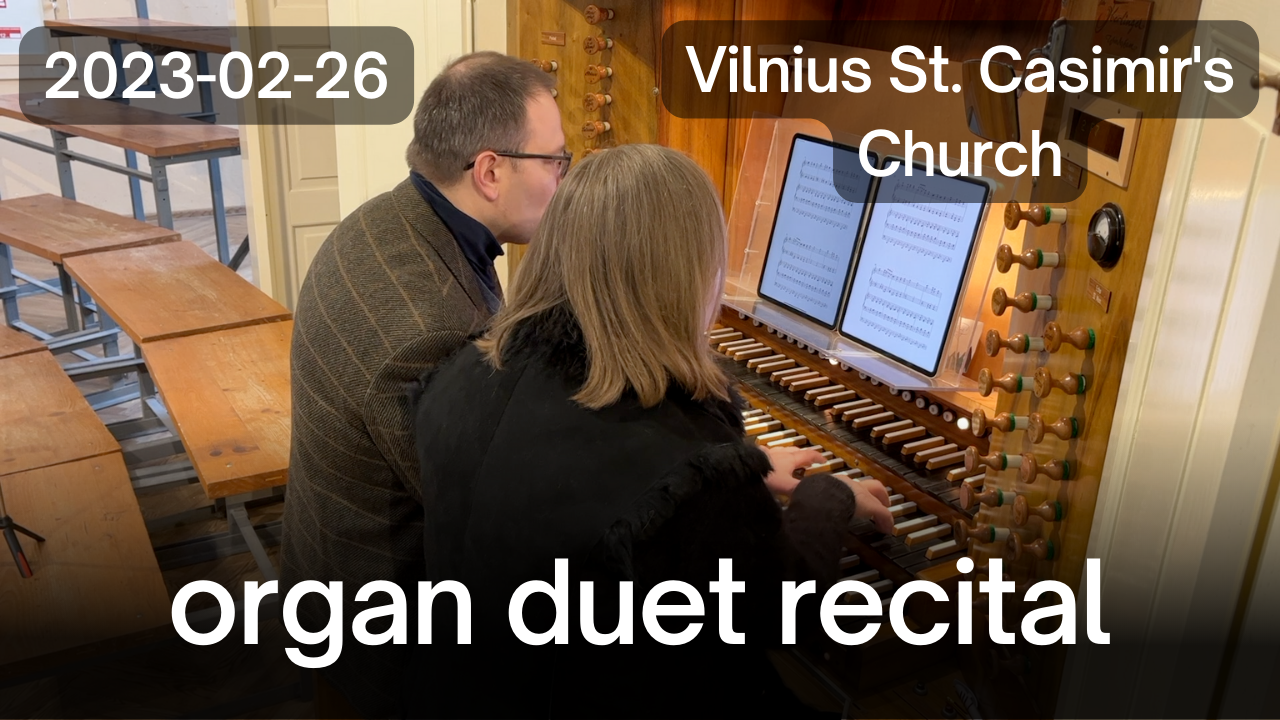
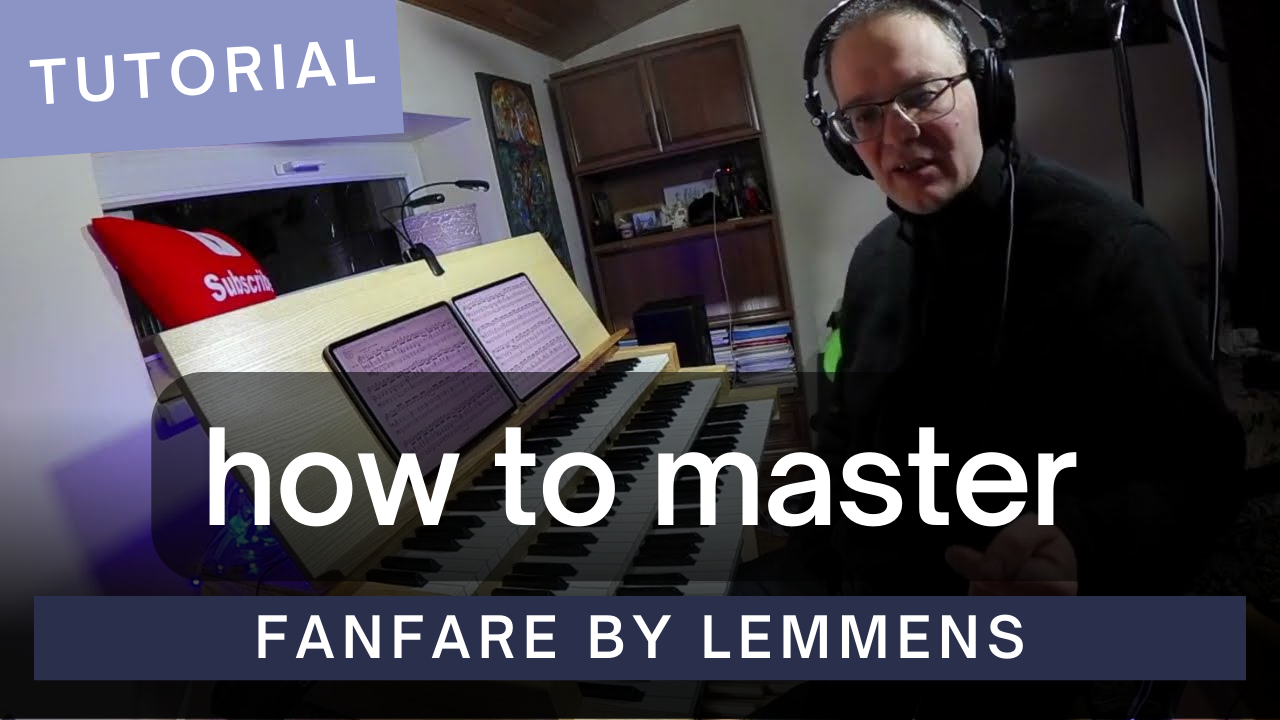
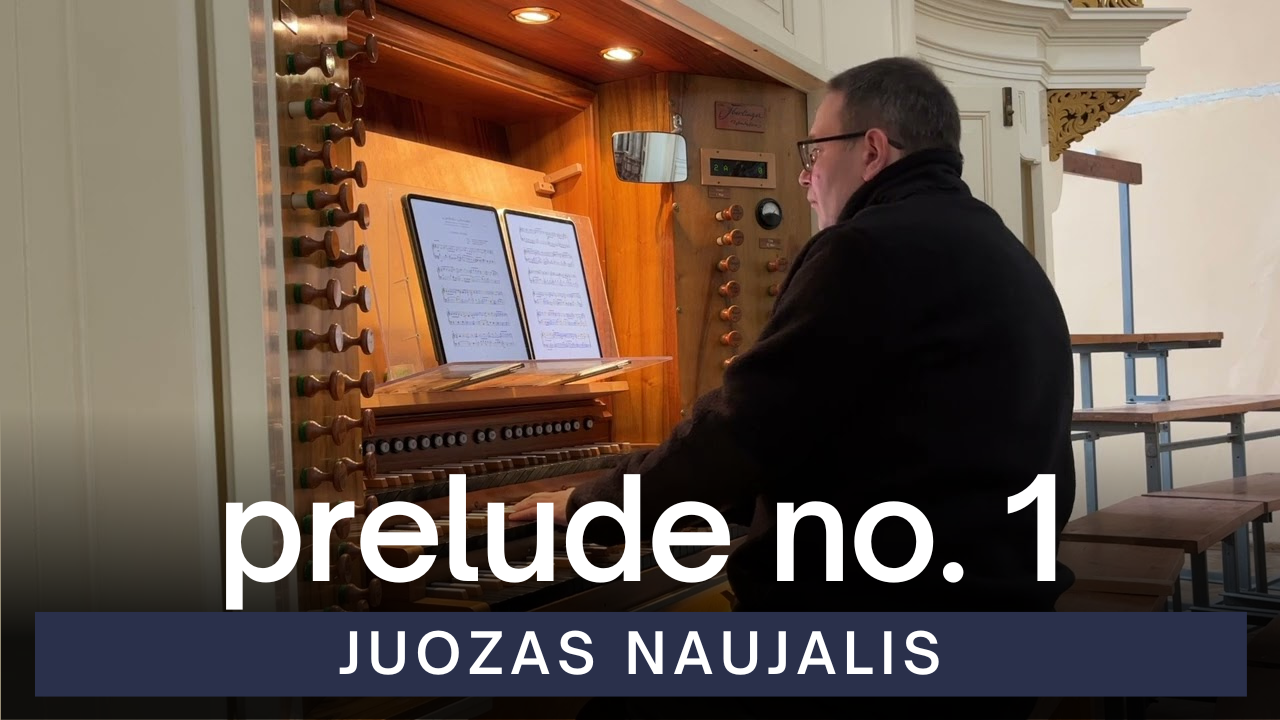
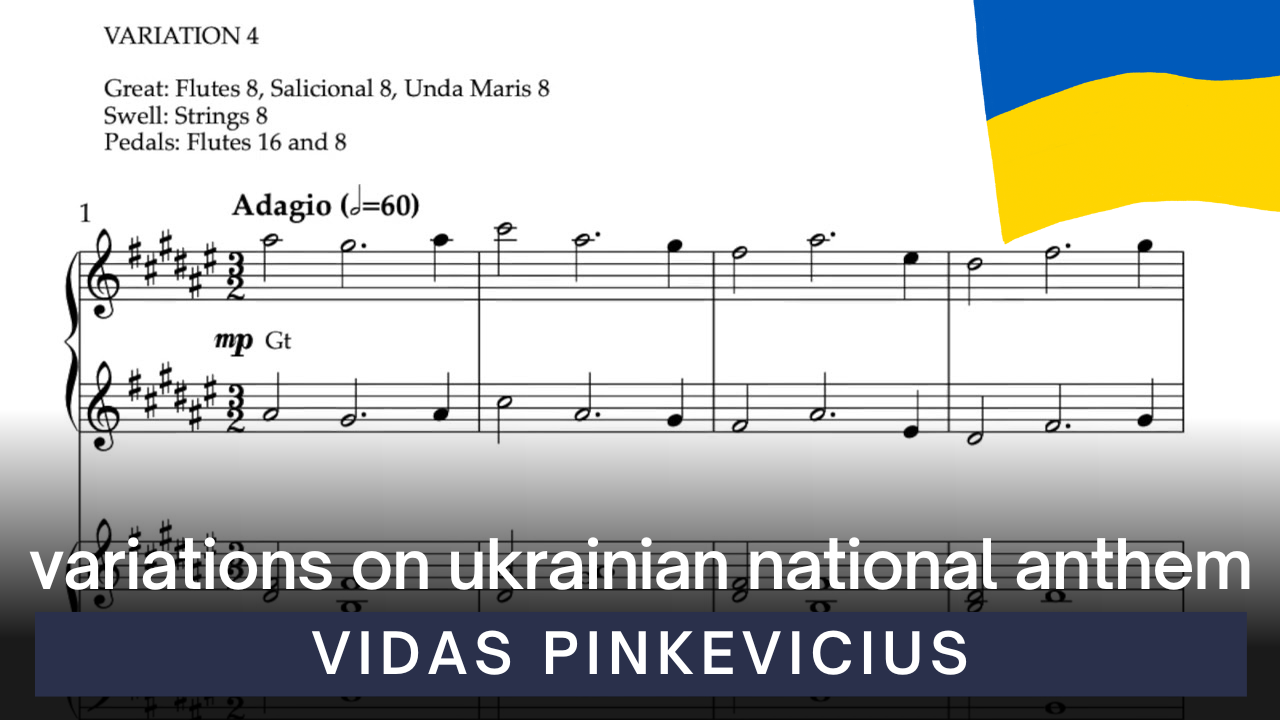
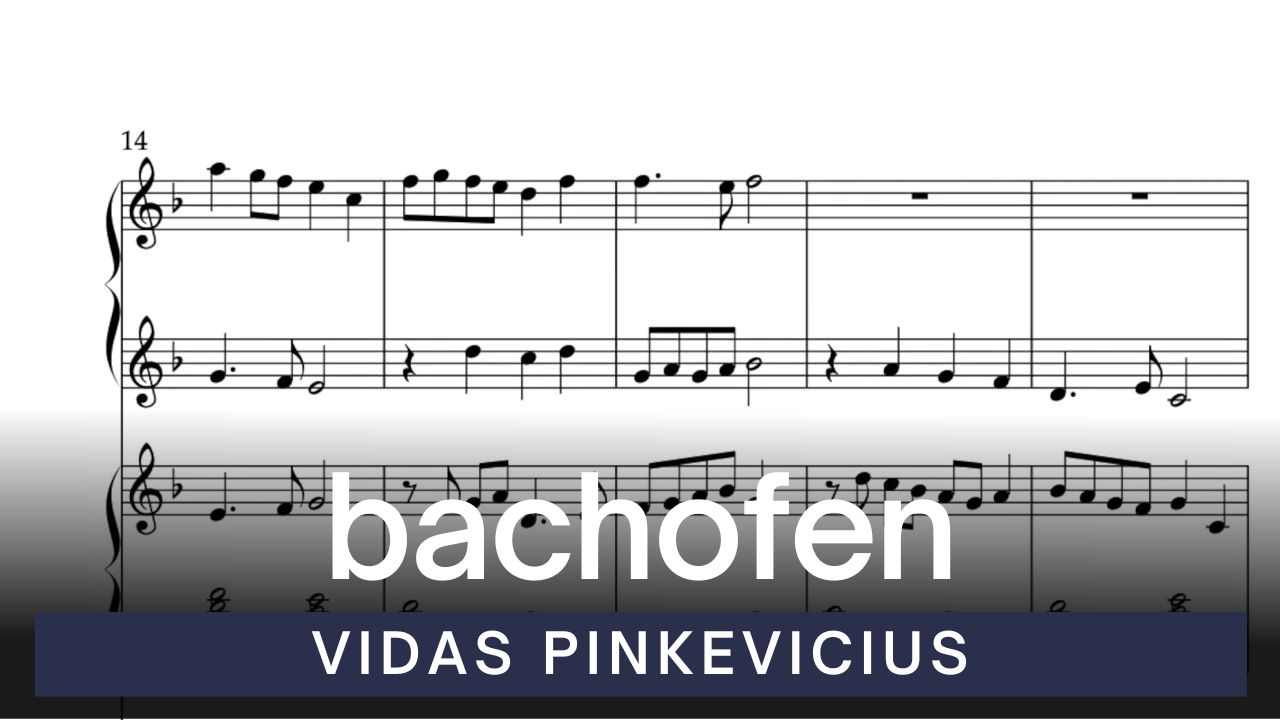
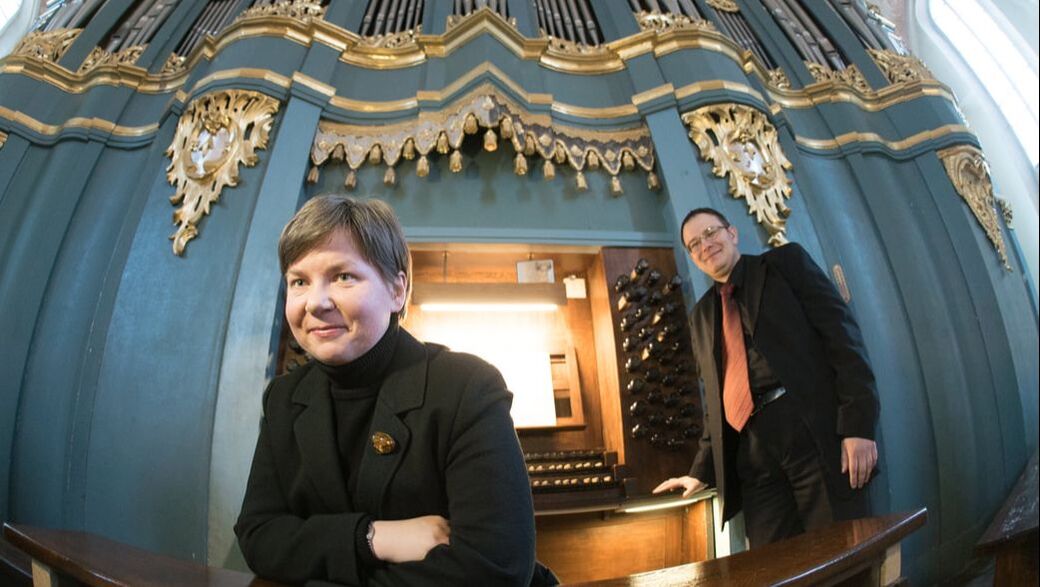
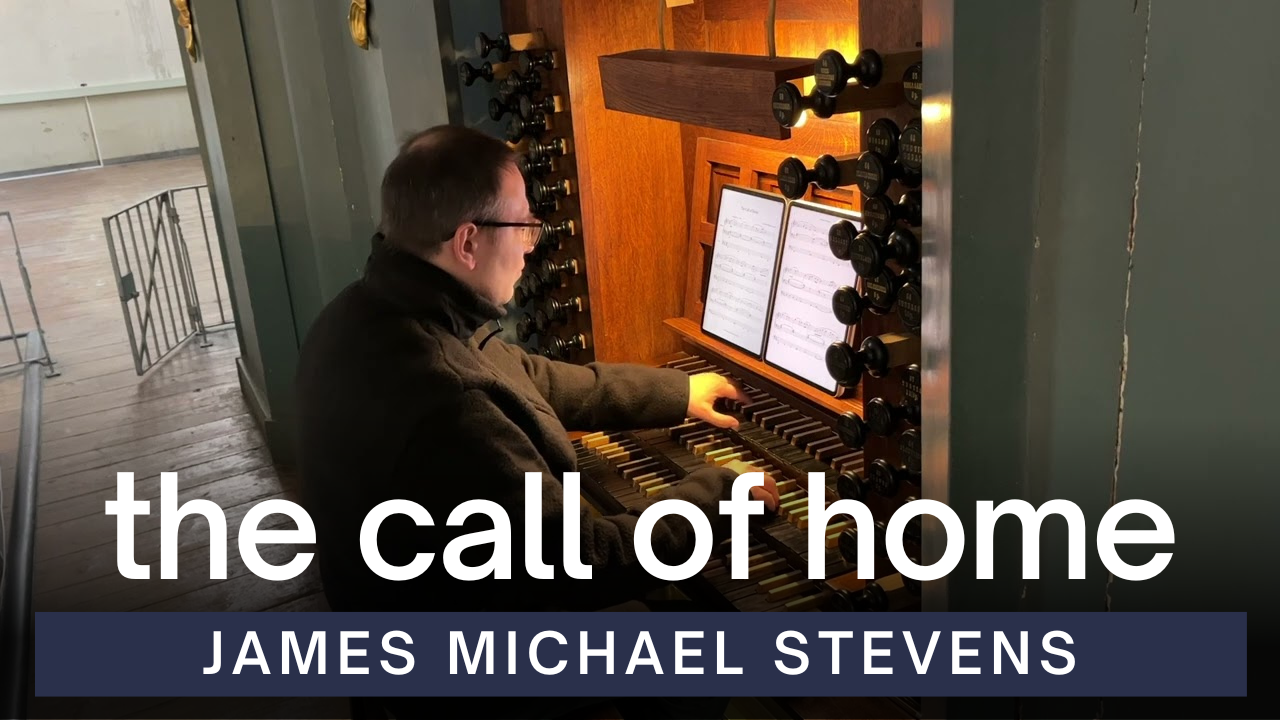
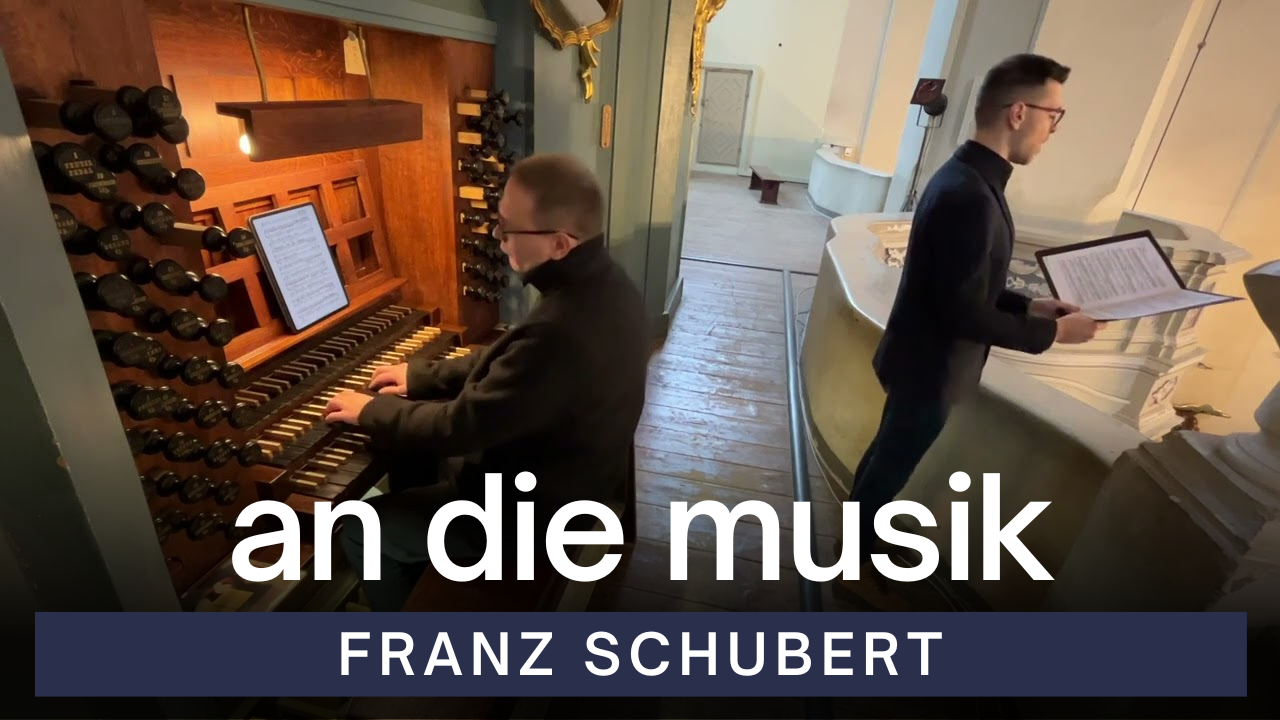
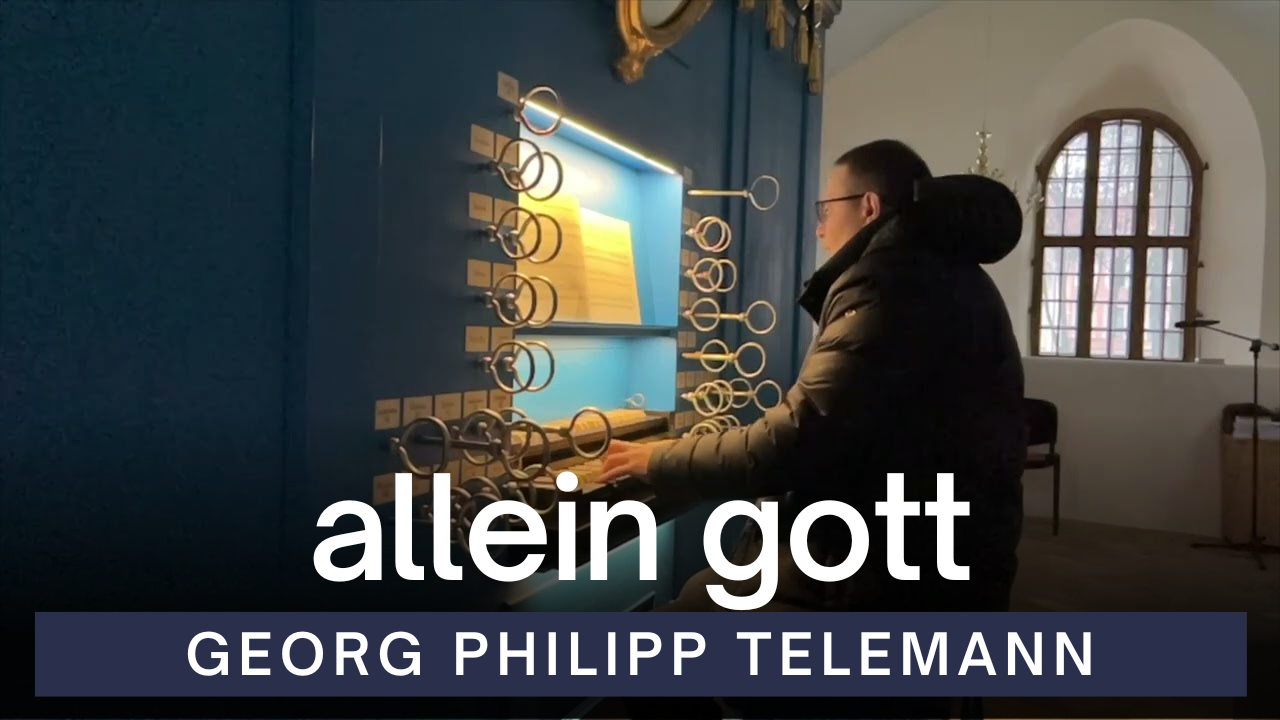



 RSS Feed
RSS Feed